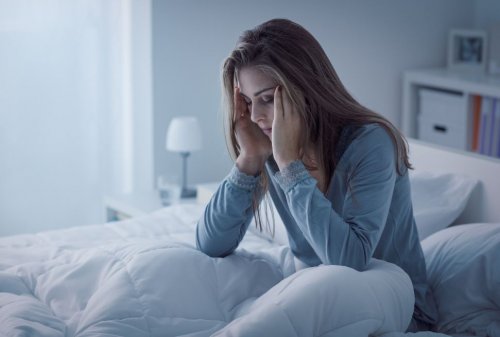Have Dinner and Exercise Before Going to Sleep?

In this article, we’ll analyze whether it’s good for the body to have dinner and exercise before going to sleep. As you’ll see, these two activities can influence a person’s health and well-being. It’s very important to respect the schedules and the body’s functioning so as not to suffer health consequences.
For athletes, schedules are one of the biggest mind-jarring issues. Exercising in the morning doesn’t have the same effects as in the afternoon or evening. Moreover, the foods eaten before or after the training session will also influence the effects of exercise.
Depending on the time of day and nutrition, the results may be totally different. In other words, the same exercise may not have any effect at all or can even be harmful to your health.
Dinner and exercise before going to sleep?
It’s important to start from the basis that each body is individual, but as a general rule, eating dinner just before going to sleep isn’t good for us. Keep in mind that it takes about two hours to digest food properly. During this time, the digestive system is working on processing the food and assimilating the nutrients.
If we lie down to try to sleep during this period, we probably won’t succeed. We’ll feel heavy because the stomach is working and the horizontal position doesn’t help us digest effectively.
If you can’t have dinner earlier, due to work or for any other reason, it’s best to opt for a light dinner. Salad, grilled fish, or grilled vegetables are easily digested.
As we said in the beginning, each body is different and that’s why we shouldn’t generalize. We all know people who can eat large quantities and then fall asleep without any problem. In contrast, others are prone to heartburn, reflux, and slow digestion.

Even if you don’t have any problems falling asleep after a late dinner, we advise you to consider that heavy dinners aren’t the best option.
After eating dinner, the body won’t make any more efforts, so it doesn’t need a lot of nutrients. In many cases, heavy dinners are the cause of people being overweight and obese.
Sports before going to sleep?
Similarly, when it comes to sports, each body reacts differently. We must know that it’s not advisable to exercise before going to sleep.
Even though some people claim that doing sports at night helps them to release tension and relax, this is not common. When we return home after running, playing tennis, or doing any other type of exercise, we feel energetic.
This is because the levels of adrenaline have raised considerably. With high levels of adrenaline, it’s practically impossible to relax and fall asleep; therefore, we must wait at least one hour to be able to lie down.
Considering all of this, it’s best to exercise at another time of the day and leave the nighttime hours for rest and relaxation.

Conclusion
After analyzing the effects that sports and nutrition have on our ability to fall asleep or not, the answer is clear. It’s appropriate to do these to activities at least two hours before going to bed. This is the best way to offer our bodies quality rest, so we can relax and avoid digestive problems.
Lastly, organize your schedule well each day to ensure that you eat a light dinner and do sports a couple of hours before going to bed. Take advantage of these two hours before your bedtime to relax and take a shower. This way, you’ll reconcile sleep and rest will be more beneficial.
In this article, we’ll analyze whether it’s good for the body to have dinner and exercise before going to sleep. As you’ll see, these two activities can influence a person’s health and well-being. It’s very important to respect the schedules and the body’s functioning so as not to suffer health consequences.
For athletes, schedules are one of the biggest mind-jarring issues. Exercising in the morning doesn’t have the same effects as in the afternoon or evening. Moreover, the foods eaten before or after the training session will also influence the effects of exercise.
Depending on the time of day and nutrition, the results may be totally different. In other words, the same exercise may not have any effect at all or can even be harmful to your health.
Dinner and exercise before going to sleep?
It’s important to start from the basis that each body is individual, but as a general rule, eating dinner just before going to sleep isn’t good for us. Keep in mind that it takes about two hours to digest food properly. During this time, the digestive system is working on processing the food and assimilating the nutrients.
If we lie down to try to sleep during this period, we probably won’t succeed. We’ll feel heavy because the stomach is working and the horizontal position doesn’t help us digest effectively.
If you can’t have dinner earlier, due to work or for any other reason, it’s best to opt for a light dinner. Salad, grilled fish, or grilled vegetables are easily digested.
As we said in the beginning, each body is different and that’s why we shouldn’t generalize. We all know people who can eat large quantities and then fall asleep without any problem. In contrast, others are prone to heartburn, reflux, and slow digestion.

Even if you don’t have any problems falling asleep after a late dinner, we advise you to consider that heavy dinners aren’t the best option.
After eating dinner, the body won’t make any more efforts, so it doesn’t need a lot of nutrients. In many cases, heavy dinners are the cause of people being overweight and obese.
Sports before going to sleep?
Similarly, when it comes to sports, each body reacts differently. We must know that it’s not advisable to exercise before going to sleep.
Even though some people claim that doing sports at night helps them to release tension and relax, this is not common. When we return home after running, playing tennis, or doing any other type of exercise, we feel energetic.
This is because the levels of adrenaline have raised considerably. With high levels of adrenaline, it’s practically impossible to relax and fall asleep; therefore, we must wait at least one hour to be able to lie down.
Considering all of this, it’s best to exercise at another time of the day and leave the nighttime hours for rest and relaxation.

Conclusion
After analyzing the effects that sports and nutrition have on our ability to fall asleep or not, the answer is clear. It’s appropriate to do these to activities at least two hours before going to bed. This is the best way to offer our bodies quality rest, so we can relax and avoid digestive problems.
Lastly, organize your schedule well each day to ensure that you eat a light dinner and do sports a couple of hours before going to bed. Take advantage of these two hours before your bedtime to relax and take a shower. This way, you’ll reconcile sleep and rest will be more beneficial.
All cited sources were thoroughly reviewed by our team to ensure their quality, reliability, currency, and validity. The bibliography of this article was considered reliable and of academic or scientific accuracy.
- Lane, S. C., Camera, D. M., Lassiter, D. G., Areta, J. L., Bird, S. R., Yeo, W. K., … Hawley, J. A. (2015). Effects of sleeping with reduced carbohydrate availability on acute training responses. Journal of Applied Physiology, 119(6), 643–655. https://doi.org/10.1152/japplphysiol.00857.2014
- Myllymäki, T., Kyröläinen, H., Savolainen, K., Hokka, L., Jakonen, R., Juuti, T., … Rusko, H. (2011). Effects of vigorous late-night exercise on sleep quality and cardiac autonomic activity. Journal of Sleep Research, 20(1 PART II), 146–153. https://doi.org/10.1111/j.1365-2869.2010.00874.x
- Brand, S., Kalak, N., Gerber, M., Kirov, R., Pühse, U., & Holsboer-Trachsler, E. (2014). High self-perceived exercise exertion before bedtime is associated with greater objectively assessed sleep efficiency. Sleep Medicine, 15(9), 1031–1036. https://doi.org/10.1016/j.sleep.2014.05.016
This text is provided for informational purposes only and does not replace consultation with a professional. If in doubt, consult your specialist.








